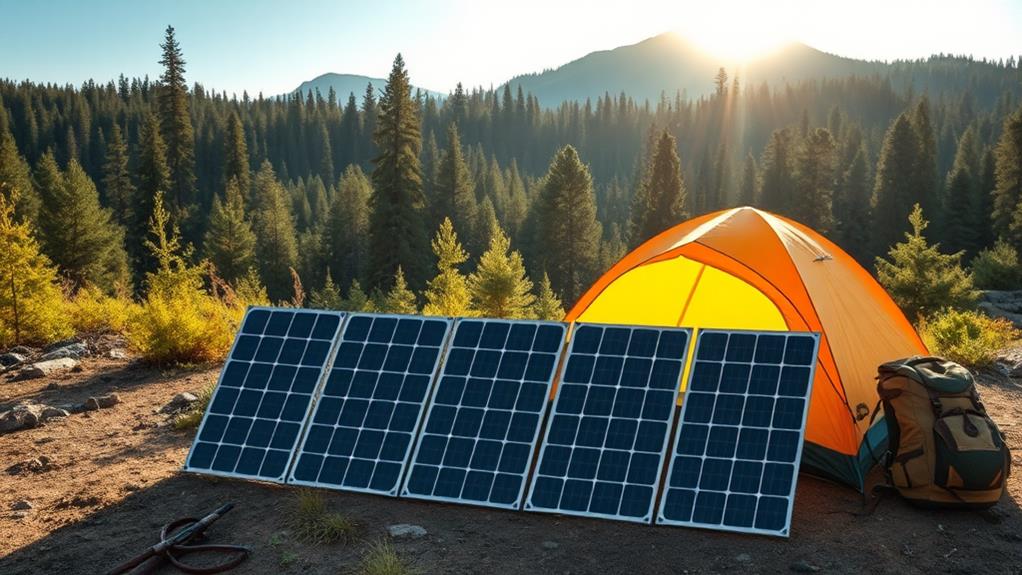In 2026, top solar micro-inverters offer enhanced efficiency and panel-level optimization. Models like VEVOR’s 1200W and Solar Micro Inverter WVC’s 2000W units provide high power output with IP67 waterproofing. Y&H’s 1200W inverter boasts easy installation and MPPT technology, while Enphase’s IQ8M is compatible with 260-460W panels. These devices typically achieve 99.5% efficiency, utilizing MPPT to boost energy generation by up to 25%. Key features include real-time monitoring, WiFi connectivity, and robust safety mechanisms. When selecting a micro-inverter, consider power capacity, efficiency, input voltage range, and long-term performance impact. Understanding these factors will help you maximize your solar system’s potential.
Key Takeaways
- Top micro-inverters in 2026 offer power outputs ranging from 1200W to 2000W, suitable for various solar panel capacities.
- High-efficiency models feature MPPT technology, boosting energy generation by up to 25% with conversion rates reaching 99.5%.
- Weather-resistant designs with IP65 or IP67 ratings ensure durability and longevity in diverse environmental conditions.
- Real-time monitoring capabilities via mobile apps or WiFi connectivity enable easy performance tracking and troubleshooting.
- Advanced safety features include automatic islanding protection and multiple safeguards against electrical and environmental hazards.








VEVOR Solar Grid Tie Micro Inverter 1200W (IP67 Waterproof)
The VEVOR Solar Grid Tie Micro Inverter 1200W stands out as a powerhouse for homeowners and businesses seeking a reliable, high-efficiency solar energy solution. With a maximum output of 1200W and an operating voltage range of DC18V-50V, this micro-inverter supports two groups of solar panel modules. Its MPPT technology boasts an impressive energy conversion efficiency of up to 99.5%, maximizing your system’s performance. The IP67 waterproof rating and sturdy aluminum alloy casing guarantee durability in various weather conditions, while the design promotes excellent heat dissipation for stable energy management.
You’ll appreciate the easy installation process, as the inverter can be mounted behind solar panels or on support structures. The mobile app allows for real-time monitoring and control, with an external antenna module guaranteeing a stable connection. This versatile micro-inverter is suitable for residential, commercial, and agricultural applications, promoting energy self-sufficiency and potential electricity bill savings.
Best For: Homeowners and businesses looking for a high-efficiency, durable, and easy-to-install solar energy solution with remote monitoring capabilities.
Pros:
- High energy conversion efficiency (up to 99.5%) with MPPT technology
- IP67 waterproof rating and sturdy aluminum alloy casing for durability
- Real-time monitoring and control via mobile app with external antenna for stable connection
Cons:
- Relatively high price point compared to some competitors
- Limited to 1200W maximum output, which may not be sufficient for larger energy needs
- Requires proper ventilation and installation away from direct sunlight for optimal performance
Solar Micro Inverter 1200W MPPT Grid Tie (Waterproof IP67)
For homeowners and businesses seeking a high-efficiency, low-maintenance solar solution, BANEBONE’s 1200W MPPT Grid Tie Micro Inverter stands out as a top contender. This compact, silver-colored device, measuring 8.27×14.72×1.57 inches, boasts an IP65 waterproof rating, guaranteeing reliable outdoor performance. With its built-in high-precision MPPT technology, you’ll experience over 25% increase in power generation, while the efficient power reverse transmission technology achieves a remarkable 99.9% transmission rate.
The inverter’s digital control system, featuring intelligent soft switching, high-frequency switching power supply, and 32-bit DSP full digital SPWM control, enhances overall performance. Six protection mechanisms, including over-temperature and short circuit safeguards, provide thorough safety. The device’s complete electrical isolation between input and output further guarantees reliability. Post-installation, you’ll benefit from a maintenance-free operation, streamlining your solar energy system’s long-term efficiency.
Best For: This solar micro inverter is best for homeowners, businesses, and off-grid applications seeking a high-efficiency, low-maintenance solar power solution with enhanced safety features and reliable outdoor performance.
Pros:
- High efficiency with over 25% increase in power generation due to MPPT technology
- IP65 waterproof rating for reliable outdoor use
- Maintenance-free operation with multiple built-in protection mechanisms
Cons:
- Limited size options may not suit all installation requirements
- Higher initial cost compared to traditional string inverters
- May require professional installation for optimal performance and safety
Y&H 1200W Solar Grid Tie Micro Inverter with MPPT
- WVC series inverter Using IP65 waterproof streamline design which effectively prevent rainwater on the surface erosion. Microinverters turn the power...
- We have improved the AC wiring solution. Configure converters for faster installation. Avoid the risk of miswiring the fire, zero and ground...
- Grid Tie Inverter can monitor in real time the power generated by the inverter through the AC digital meter.(Voltage, current, active power,...
Last update on 2026-02-17 / Affiliate links / Images from Amazon Product Advertising API
Designed for homeowners seeking a versatile and efficient solar solution, the Y&H 1200W Solar Grid Tie Micro Inverter with MPPT stands out with its waterproof IP65 design and flexible connection options. This inverter supports single-phase or three-phase connections and is optimized for high-powered 60-cell and 72-cell modules. It’s suitable for 4x250W-300W 36V solar panels with Vmp 30-39V and Voc 36-50V, utilizing MC4 connectors to prevent polarity reversal. The unit features high precision phase detection, over/under voltage protection, and islanding protection, ensuring safe and reliable operation.
Installation is straightforward, typically completed in under 15 minutes, with plug-and-play functionality. The inverter’s low DC voltage (up to 50V) reduces fire and electric shock risks. Users report consistent outputs, with some achieving 550-600 watts on sunny days. The AC digital meter displays essential data, including voltage, current, and power factor, enhancing system monitoring capabilities.
Best For: Homeowners seeking an efficient, easy-to-install solar solution for small to medium-sized residential setups, particularly those with 60-cell or 72-cell solar panels.
Pros:
- Easy installation and plug-and-play functionality
- Waterproof IP65 design for outdoor durability
- Comprehensive digital display for real-time monitoring
Cons:
- Potential overheating issues when exceeding recommended panel capacity
- Some reports of quality control concerns and malfunctioning units
- May require additional cooling solutions in extreme temperatures
Solar Micro Inverter, 2000W Grid Tie MPPT Pure Sine Wave
Boasting a robust 2000W rated output power, the Solar Micro Inverter WVC-2000W is ideal for homeowners seeking high-efficiency solar energy conversion. This grid-tie MPPT pure sine wave inverter features an advanced MPPT algorithm, maximizing power collection and increasing generation by over 25%. With a static MPPT efficiency of 99.50% and a maximum output efficiency of 95%, the WVC-2000W guarantees peak performance. The inverter’s IP65 waterproof rating and aluminum alloy construction make it suitable for outdoor installations, while its self-cooling design enhances durability.
The WVC-2000W adapts to both 120V and 230V systems, offering flexibility for various grid configurations. Its input voltage range of 33-60V (open circuit) and 22-60V (power tracking) accommodates a wide array of solar panel setups. The inverter’s WiFi connectivity enables remote monitoring and operation via a mobile app, providing real-time performance data and control options for tech-savvy users.
Best For: Homeowners and small businesses looking to maximize solar energy production with a high-efficiency, grid-tied system that offers advanced monitoring capabilities and flexible installation options.
Pros:
- High efficiency with 99.50% static MPPT efficiency and 95% maximum output efficiency
- Versatile compatibility with both 120V and 230V systems
- WiFi connectivity for remote monitoring and control via mobile app
Cons:
- Relatively heavy at 9.02 pounds, which may complicate installation
- Limited to 2000W rated output, which may not be sufficient for larger energy needs
- May require professional installation due to complexity of grid-tie systems
Enphase IQ8M Microinverter for Solar Panels (IQ8M-72-2-US)
The Enphase IQ8M Microinverter stands out as a versatile choice for both grid-tied and off-grid solar PV systems. Designed for 260-460 Watt panels, this UL-listed 240V model (IQ8M-72-2-US) is compatible with battery storage solutions. During performance testing, the inverter operated steadily between 22V and 26-27V, with some instability noted in this range. It successfully handled 65V for brief periods without overheating. The IQ8M requires a 3-minute startup period and gradually ramps up to full wattage. Monitoring over a 10-15 minute period with volt, amp, and watt meters revealed consistent performance and cool operation under full load. However, potential buyers should note that the inverter may arrive without a connector, which could affect initial setup. Despite voltage stability concerns, the IQ8M earns a 4-star rating for its overall capabilities.
Best For: This microinverter is best for homeowners and installers looking for a flexible solar solution that can work with both grid-tied and off-grid systems, as well as battery storage.
Pros:
- Compatible with a wide range of solar panel wattages (260-460W)
- Suitable for both grid-tied and off-grid systems, with battery compatibility
- Performs well under full load while maintaining cool operation
Cons:
- Experiences some voltage instability between 22V and 26-27V
- Requires a 3-minute startup period before reaching full wattage
- May arrive without a connector, potentially complicating initial setup
1400W Solar Grid Tie Microinverter (Waterproof, 120V/110VAC Output)
High-efficiency solar power conversion awaits with the 1400W Solar Grid Tie Microinverter from PowMr. This waterproof unit, boasting an IP65 rating, delivers 120V/110VAC output and operates within a 22-50VDC input range. With a 99.5% efficiency rating and Maximum Power Point Tracking (MPPT), it maximizes energy harvest from your solar panels. The microinverter features automatic island effect protection, constant current, and constant power output for enhanced reliability.
You’ll appreciate the self-cooling design and the automatic 6-grade power search function, optimizing performance in low output conditions. The device supports stacking, allowing you to combine multiple units for increased power output. For example, four 260W microinverters can achieve 1040W. The included WiFi control and meter facilitate easy monitoring and management of your solar system. With a 50Hz/60Hz output frequency range and a 30-day return guarantee, this PowMr microinverter offers a robust solution for your residential solar power needs.
Best For: Homeowners looking to implement a high-efficiency, grid-tied solar power system with easy monitoring and scalability.
Pros:
- High efficiency (99.5%) with Maximum Power Point Tracking for optimal energy harvest
- IP65 waterproof rating and self-cooling design for durability and reliability
- WiFi control and included meter for easy monitoring and management
Cons:
- Limited customer feedback with only 11 ratings
- May require multiple units for higher power needs, increasing overall cost
- Specific input voltage range (22-50VDC) may limit compatibility with some solar panel configurations
Factors to Consider When Choosing a Solar Energy Micro-Inverter

When selecting a solar energy micro-inverter, you’ll need to take into account several critical factors that impact performance, reliability, and overall system efficiency. These factors include the power output capacity, which determines the inverter’s ability to handle your solar panel’s wattage, the efficiency and Maximum Power Point Tracking (MPPT) technology for peak energy conversion, and the durability and weather resistance to guarantee longevity in various environmental conditions. Additionally, you should evaluate the ease of installation and maintenance, as well as the monitoring and connectivity features that allow for real-time performance tracking and remote diagnostics.
Power Output Capacity
Before diving into your micro-inverter purchase, you’ll need to contemplate power output capacity carefully. Micro-inverters typically range from 1200W to 2000W, determining the amount of energy they can convert from solar panels to usable electricity. It’s essential to match the inverter’s capacity with your solar panel array’s combined wattage to prevent performance issues. Exceeding the inverter’s capacity can lead to overheating and reduced efficiency, compromising your system’s overall performance.
When selecting a micro-inverter, consider models that utilize Maximum Power Point Tracking (MPPT) technology, which can boost energy generation efficiency by up to 25% compared to traditional systems. Additionally, pay attention to the inverter’s input voltage range, usually between 18V and 60V, to ascertain compatibility with your solar panel configuration. Some high-performance micro-inverters offer peak outputs that exceed their rated capacity for short durations, enhancing system performance during peak sunlight hours. By carefully evaluating these factors, you’ll optimize your solar energy system‘s efficiency and maximize your return on investment. Remember, the right micro-inverter will greatly impact your system’s long-term performance and energy production capabilities.
Efficiency and MPPT Technology
As you evaluate solar energy micro-inverters, efficiency and Maximum Power Point Tracking (MPPT) technology should be at the forefront of your considerations. MPPT algorithms optimize power output by continuously adjusting to varying environmental conditions, guaranteeing each solar panel operates at peak performance. This technology can boost power generation by over 25% compared to non-MPPT systems, making it an essential feature for maximizing your solar investment. Many micro-inverters now achieve high conversion efficiency rates, with some models boasting efficiencies of up to 99.5%. These high-efficiency ratings directly correlate with reduced energy losses, translating to significant cost savings on your electricity bills.
When selecting a micro-inverter, pay close attention to its MPPT capabilities and efficiency ratings. The performance of MPPT technology is particularly beneficial in partially shaded or variable light conditions, allowing for more consistent energy production throughout the day. By choosing a micro-inverter with advanced MPPT algorithms and high efficiency, you’ll guarantee that your solar panels operate at their maximum potential, regardless of environmental factors. This optimization can lead to enhanced overall system performance and increased long-term energy yields from your solar installation.
Durability and Weather Resistance
In the domain of solar energy micro-inverters, durability and weather resistance stand as vital factors for long-term performance and reliability. When selecting a micro-inverter, prioritize models with robust waterproof ratings, such as IP67 or IP65, which guarantee protection against water, dust, and moisture ingress. These ratings are fundamental for maintaining consistent outdoor performance in varying environmental conditions. Opt for micro-inverters constructed from sturdy materials like aluminum alloy, which not only enhance durability but also provide superior heat dissipation properties.
Consider units featuring self-cooling designs or advanced heat management systems to prevent overheating and maintain stable operation across a wide temperature range. It’s essential to select micro-inverters capable of withstanding extreme weather conditions, including high temperatures and heavy precipitation. Look for models incorporating built-in protection mechanisms against over-voltage, over-temperature, and short circuits, as these features greatly improve safety and longevity in harsh environments. By carefully evaluating these durability and weather resistance aspects, you’ll guarantee your solar energy system remains efficient and operational for years to come, maximizing your investment and minimizing maintenance requirements.
Installation and Maintenance Ease
When choosing a solar energy micro-inverter, you’ll want to prioritize installation and maintenance ease. Look for models that offer rapid setup processes, with some manufacturers boasting installation times of under 15 minutes, considerably reducing labor costs and complexity. Plug-and-play functionality is another vital feature, as these systems automatically activate upon detecting home electricity, eliminating the need for manual startup procedures.
To minimize post-installation upkeep, select micro-inverters with maintenance-free designs. While occasional dust cleaning may be recommended, these units typically require minimal attention over their operational lifespan. Consider inverters that support stacking capabilities, allowing for flexible installation configurations that can adapt to varying power demands without complicating the process. This feature is particularly beneficial for system expansions or modifications.
The cooling design of the micro-inverter is also a key factor. Opt for models with self-cooling mechanisms, as these enhance reliability and performance across diverse environmental conditions. Such designs can mitigate the need for additional cooling systems, reducing both installation complexity and long-term maintenance requirements. By prioritizing these features, you’ll guarantee a smoother, more efficient solar energy system integration and operation.
Monitoring and Connectivity Features
Along with installation ease and maintenance, monitoring and connectivity features play an essential role in choosing the right solar energy micro-inverter. Modern micro-inverters often come equipped with mobile app connectivity, allowing users to track energy production and system performance in real-time. This feature enables you to monitor your solar system’s efficiency and output from anywhere, providing valuable insights into its operation.
Many models incorporate external antenna modules to enhance connection stability, ensuring consistent updates on device status and performance metrics. You’ll find that some micro-inverters feature digital displays, offering detailed information on voltage, current, power output, and energy consumption. These displays facilitate a deeper understanding of your system’s efficiency and help identify potential issues quickly. WiFi control capabilities enable remote management of the inverter, allowing you to adjust settings or monitor performance without physical access to the device. Advanced monitoring features often include troubleshooting capabilities, which can considerably reduce system downtime and enhance overall reliability. When selecting a micro-inverter, consider these connectivity options to maximize your ability to manage and optimize your solar energy system effectively.
Safety and Protection Mechanisms
Safety and protection mechanisms are significant factors to take into account when choosing a solar energy micro-inverter. When evaluating options, you’ll want to prioritize models that incorporate multiple layers of protection. Look for micro-inverters equipped with thorough safeguards, including over-temperature, under-voltage, over-voltage, short circuit, and overload protection. These features guarantee the inverter’s safe operation under various conditions, minimizing the risk of electrical hazards and equipment damage.
Waterproofing is another important aspect to contemplate. Select micro-inverters with an IP65 rating or higher to protect against moisture infiltration, which can lead to electrical faults. Additionally, opt for models that provide electrical isolation between input and output, enhancing overall system safety. Automatic islanding protection is a key feature that disconnects the inverter from the grid during power outages, preventing backfeeding and guaranteeing utility worker safety. Finally, consider micro-inverters with efficient cooling designs to manage heat dissipation effectively. This reduces the risk of overheating and extends the unit’s lifespan. By prioritizing these safety and protection mechanisms, you’ll secure a reliable and safe solar energy system that operates efficiently and safely over the long term.
Frequently Asked Questions
How Do Micro-Inverters Affect Solar Panel Warranties?
You’ll be amazed at how micro-inverters can impact your solar panel warranties! These innovative devices typically don’t affect the panel manufacturer’s warranty itself. However, they often come with their own extended warranties, sometimes up to 25 years, surpassing traditional string inverter coverage. This can provide you with thorough protection for your entire solar system. It’s essential to review the specific terms, as some micro-inverter manufacturers may offer additional guarantees or performance warranties that complement your panel’s coverage.
Can Micro-Inverters Be Retrofitted to Existing Solar Panel Systems?
You can retrofit micro-inverters to existing solar panel systems, but it’s not always straightforward. The process involves disconnecting panels, installing micro-inverters on each module, and reconfiguring the system’s wiring. You’ll need to verify compatibility with your panels’ voltage and power ratings. It’s essential to evaluate the cost-benefit ratio, as retrofitting can be expensive. Additionally, you’ll need to update your system’s monitoring setup and possibly obtain new permits. Professional installation is recommended to maintain safety and warranty compliance.
What’s the Typical Lifespan of a Solar Micro-Inverter?
You’ll find that micro-inverters typically enjoy an extended period of operational efficacy. Most high-quality solar micro-inverters have a lifespan of 20-25 years, aligning closely with the longevity of solar panels themselves. They’re designed to withstand harsh outdoor conditions, including temperature fluctuations and moisture exposure. However, it’s important to emphasize that factors such as manufacturing quality, installation practices, and maintenance routines can greatly impact their durability. You’ll want to consult the manufacturer’s warranty for specific lifespan expectations.
Are Micro-Inverters Compatible With Battery Storage Systems?
Yes, micro-inverters are generally compatible with battery storage systems, but you’ll need to guarantee proper integration. Many modern micro-inverters support AC-coupled battery solutions, allowing you to store excess energy for later use. You’ll typically require an additional hybrid inverter or battery management system to interface between the micro-inverters and batteries. When designing your system, consider factors such as voltage compatibility, communication protocols, and load management capabilities to optimize performance and maximize energy efficiency.
How Do Micro-Inverters Impact the Overall Cost of a Solar Installation?
“A penny saved is a penny earned,” and you’ll find this adage rings true when considering micro-inverters for your solar installation. While they’ll increase your initial costs by 15-20%, you’ll reap long-term benefits. You’re investing in enhanced system efficiency, typically 5-10% higher than string inverters. You’ll also enjoy improved monitoring capabilities, easier maintenance, and longer warranties. Additionally, micro-inverters allow for system expansion and can increase your property’s value, offsetting the upfront expense.










